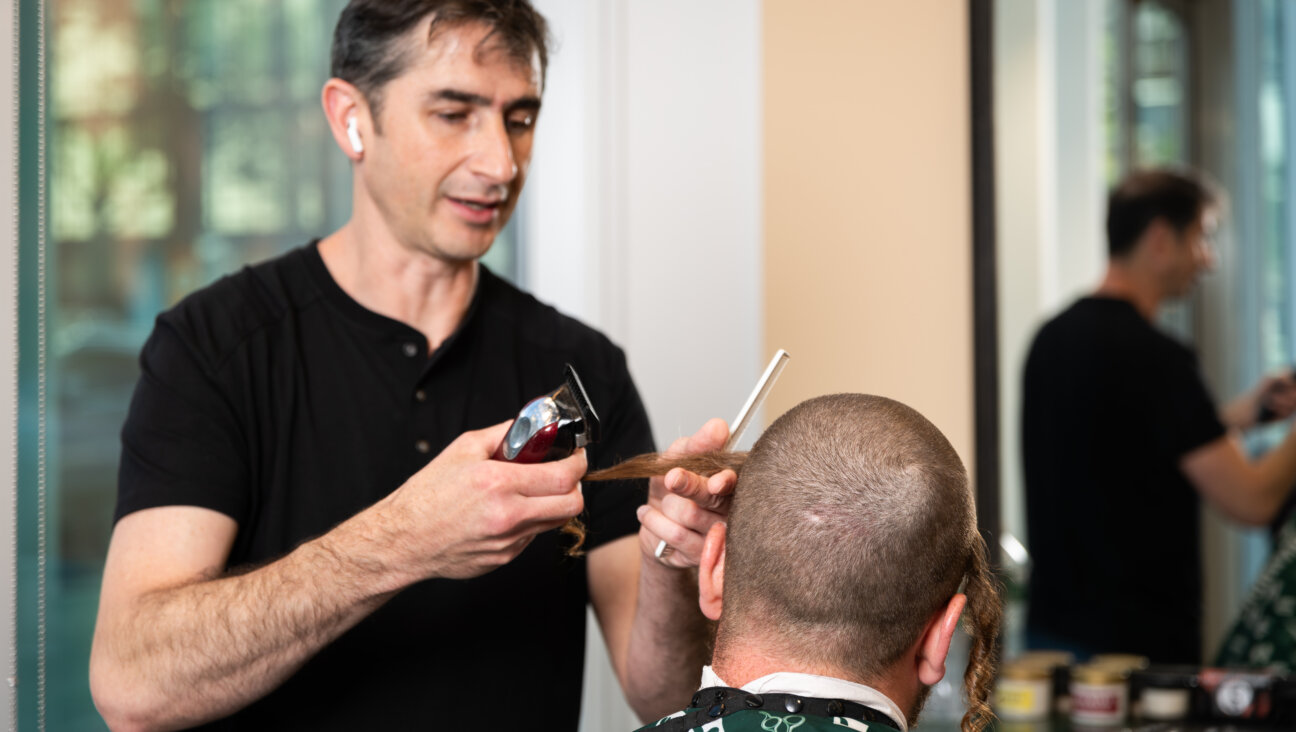BINTEL BRIEFI sat shiva for my sister because she hates Israel. Should I bother reconciling?
Bintel says boundaries might help mend this ‘Sister Split’ — but it won’t be easy

Graphic by Angelie Zaslavsky
The Forward has been solving reader dilemmas since 1906 in A Bintel Brief, Yiddish for a bundle of letters. Send us your quandaries about Jewish life, love, family, friends or work via email, Twitter or this form.
Hi Bintel,
About a year ago, my sister, who married outside the tribe, wrote on Facebook: “Israel is an apartheid country; I fully support BDS,” referring to the Boycott, Divestment and Sanctions movement against Israeli businesses and institutions.
I immediately sat shiva for her and cut her out of my life for her clearly antisemitic statements. I sent her a subscription to FLAME (Facts and Logic About the Middle East) and wrote that I hoped that she would change her mind. I’ve been a citizen of Israel since 1984.
I never told my sister about sitting shiva. I’m not sure if I want any relationship with her going forward, but if she were to renounce her antisemitism, that might go a long way in reestablishing a relationship with her. Your thoughts?
Signed,
Sister Split
Dear Sister Split,
I’m so sorry to hear that you and your sister are estranged. No matter the context, it is always heartbreaking when there is a rupture within families, whether chosen or biological.
You write that you’re “not sure” if you want a relationship with your sister, but I doubt that you would be writing to the preeminent Jewish advice column if you felt satisfied with where things stand. I also think that you never told her about the shiva to avoid causing her greater suffering.
That was smart. The idea of sitting shiva for a living relative over a political disagreement has no basis in Jewish law, and demands some deep reflection on your part before you even consider reaching out to your sister for possible reconciliation.
It seems from your letter that you see the situation in black and white terms: Criticism of Israel = antisemitism; antisemitism (from a sibling) cannot be permitted in my life. This reductionist approach is dangerous when applied to the complicated situation in the Middle East — and to the complex relationships we share with close relatives. Your move to mourn your sister, as if she had died, because she does not share your views on Israel, feels abrupt, and antithetical to Jewish tradition.
Antisemitism vs. anti-Zionism
You originally broke off contact with your sister because she expressed support for the BDS movement and declared Israel to be an apartheid state. Many people feel as you do: that Jews must support the Jewish homeland in its contemporary form, though many people — including many committed Jews — do not. You also made a huge, unsupported leap when characterizing your sister’s post as “clearly antisemitic.” There is a robust debate, again among Jews of different beliefs, over when criticism of Israel and anti-Zionism veers into antisemitism.
The International Holocaust Remembrance Alliance, for example, does not hold that all Israel-bashing is antisemitic. The group’s working definition of antisemitism, released in 2016, states that “criticism of Israel similar to that leveled against any other country cannot be regarded as antisemitic,” but holding Israel to a different standard than one would any other nation might be. This criticism could include describing Israel as committing the crime of apartheid. In recent years, human rights groups including the Israeli B’tselem, have used that term to describe the Jewish state’s unequal treatment of Palestinians in Israel, and the occupied West Bank and Gaza Strip.
Regardless of the IHRA definition, your labeling of your sister’s comments as “clearly antisemitic” suggests an erasure of all the other things that make up Judaism, and Jews: Shabbat dinners, b’nai mitzvah, history, family, ritual. There are many anti-Zionist Jews that feel deeply connected to their Jewish identity. You may not agree with your sister’s support of BDS, or her statement that Israel is an apartheid state, but they are only one component of her Jewishness.
None of this is to negate the real pain and shock you must have felt seeing your sister denigrate the Jewish state where you are a proud citizen. Her actions certainly warrant a conversation, and you are far from the first family members to experience a rupture over Israel or politics generally. But the situation demands a desire to understand each other if the ruptured relationship has any hopes of being repaired.
The shiva situation
The choice to mourn for your sister as if she had died is a profound one. I consulted two rabbis — Zach Golden, our deputy Yiddish editor, and Jonathan Leener, of Prospect Heights Shul in Brooklyn, New York — and both said that sitting shiva for a living person is halachically meaningless, and cannot be observed.
I do not know how your sister expresses her Jewishness, but fidelity to the Jewish state of Israel is not one of the 248 positive mitzvot Jews are commanded to perform.
“To sit shiva for a living person is to say ‘I am renouncing this person’s capacity to change,’” Rabbi Leener said. “That goes against the core of Jews’ belief in change and relationships, that nothing is ever truly broken permanently.”
I strongly urge you to consider making teshuvah for having sat shiva. Teshuvah, or repentance, is one of the most powerful and beautiful concepts in Judaism, which the great 12th century philosopher Maimonides describes as requiring four key steps: Recognize and discontinue the action. Confess it. Feel remorse over it, and vow to never do it again.
Your sister is, separately, going to have to consider whether and how she would like to reconnect. I imagine that having you cut off communication save for a subscription to an Israel advocacy newsletter was pretty upsetting. She may not want to restore a relationship with a family member who would let politics sever ties so completely.
I say all this not to arbitrate over who is “at fault,” but to emphasize that relationships are fluid, live things between two people, that cannot be controlled by one or the other. Jewish tradition prepares us for moments of rupture like this, and I have faith that you and your sister can reconcile.
Nay to conditions, yay to boundaries
In a practical sense, giving another person explicit conditions to be in relationship with you often leads to frustrated expectations. Relationships require some relinquishing of control. We cannot force people to be a certain way or to believe the same things we believe.
Instead of conditions, well-communicated boundaries are the strongest foundations upon which to build relationships. The difference between a boundary and a condition is that a boundary is one we self-impose and have control over. In your case, a potential boundary with your sister may be that Israel is not a topic of conversation. Such a boundary, which you and your sister would define more specifically together, could shore up each of your feelings of safety.
Before potentially moving forward in reconnecting with your sister, it is essential to think about what boundaries you’d need. If your boundary to be connected to your sister again is that she become an ardent Zionist, it may not be worth reaching out to her.
The heart of the matter is this: Can you, Sister Split, be in a relationship with someone who feels differently than you do on this issue? The rest is housekeeping.
Signed,
Bintel
Editor’s note: Corrected to show that halachically, there are no circumstances in which one sits shiva for a living person.
Do you have an opinion about this Bintel, or a question of your own? We’d love to hear from you. Email [email protected].




















